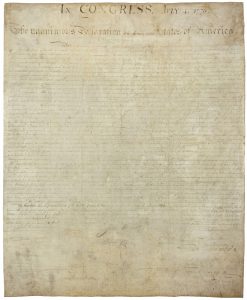Note: In the U.S., July 4th is a national holiday, celebrated as Independence Day. It is the day when in 1776 the American colonies declared their independence from Great Britain.
∼∼∼∼
 How many startup founders do you suppose can discourse on the planting of corn, expound on the best practices in viticulture, design a machine to make macaroni, and author a document that 243 years later will be so revered it is protected by armed guards?
How many startup founders do you suppose can discourse on the planting of corn, expound on the best practices in viticulture, design a machine to make macaroni, and author a document that 243 years later will be so revered it is protected by armed guards?
That was Thomas Jefferson, the third president of the U.S. and one of the more celebrated of the nation’s founders, collectively known as the “founding fathers.”
American histories focus on the political work of these men, and there is no doubt it was as prodigious as it was courageous; all 56 signers in challenging the world’s most powerful nation risked their wealth and their lives. Two of the signers later became president. Others became governors, legislators or served in the other key government capacities.
But men like Jefferson, Robert Morris, Benjamin Franklin, and, though he wasn’t a delegate, George Washington, were also innovative businessmen, who centuries before Silicon Valley became a synonym for startup, started up a nation.
Jefferson, an inventive innovator and one of those who truly deserves the title “Renaissance Man,” was the nation’s first patent examiners. Reluctant to grant a monopoly to anyone for inventions that would better living conditions and improve the lot of ordinary citizens, Jefferson eventually warmed to the idea that a patent would encourage progress and encouraged the creation of a patent office.
As president, when presented with an acquisition, Jefferson made the deal doubling the size of the fledgling country with the Louisiana Purchase.
Benjamin Franklin, another of the signers and himself an inventor, had what today we would call a “portfolio career.” A printer by trade, Franklin tried out multiple roles, before settling on diplomat. Sent to France, his task was to enlist partners for the American startup, enlisting France as a key supporter and aiding in convincing Spain and the Netherlands to provide assistance.
A student of agriculture more so than a farmer (he was more a gentleman farmer), Franklin wrote books and scholarly articles on the subject. He made his money in printing, becoming successful after networking his way into a contract to print money for the Pennsylvania colony.
Think of Robert Morris as the American startup’s venture capitalist and early angel investor. He almost singlehandedly financed the Revolutionary War, though he was joined in some of the later financing rounds by Spain, France and other countries. He later went on to create a national bank, the precursor to today’s Federal Reserve.
George Washington, a land surveyor who became a general and won the Revolution despite limited experience in soldiering, became the startup’s CEO after the first organizational structure failed. Elected the first president of a country with no precedent and unique as a constitutional government, it fell to him to provide the adult supervision. He managed to fashion from nothing a civil authority, stitching together 13 previously independent states.
Many years and much struggling later, the startup reached unicorn status. It’s that success that the United States celebrates today.
Happy 4th of July!
